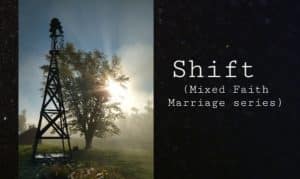The act of expressing doubt or questioning beliefs is stigmatized in our church culture. Ward leaders and members tend to show great patience and understanding to investigators, children, and new members who ask doctrinally difficult questions but in some cases, life-long or adult members working through their beliefs are not afforded the same compassion. Doubts are often seen as spiritual weakness or deficiency rather than as part of the natural process of cultivating belief and curating testimony.
What if our anxiety about hearing doubts expressed is unnecessary? What if the questions many of us perceive as spiritually threatening are actually gifts from a gracious God? When I heard Terryl Givens lecture about his newest book, The Crucible of Doubt, I was surprised when he listed doubting as a “hidden gift” among other gifts of the Spirit from D&C 46.
“To some it is given by the Holy Ghost to know that Jesus Christ is the Son of God, and that he was crucified for the sins of the world. To others it is given to believe on their words, that they also might have eternal life if they continue faithful.” (emphasis added)
To those not given the gift of testimony of Jesus Christ, according to Givens, the gift of their doubt is to consciously make the choice to believe, and is every bit as worthy and valid as any other gift – that all may be profited thereby. We need doubters among us.
The poor and outcast Zoramites who approached Alma for help had been excluded from worshipping God in their synagogue. They were “despised of all men and priests, esteemed as dross, and cast out from the synagogues they labored to build with their own hands.” Likewise, today, many adult and teen members of the church who express doubts or ask questions have been shunned, released from callings, asked to turn in their temple recommends, excluded from class discussions, disqualified from serving in leadership positions, and forbidden from teaching, speaking or praying in church meetings. Some are asked to leave and not return. Facing such inhospitable reception among their church worship communities or families, many of these members justifiably find other places and people to nurture their spirituality, leaving a large, gaping wound in the Body of Christ with their absence. While understanding the choices and imperatives of those who no longer attend, my heart grieves their loss every day – their contributions of strength, virtue and wisdom are so needed and so missed.

When I hear missionaries explain their teaching process for new investigators, I envision a long domino train in the style of If you Give a Mouse a Cookie: read and pray about the Book of Mormon to know if it is true, and that will lead you to believe that Joseph Smith was a prophet, which will lead you to believe in priesthood restoration and keys, and modern revelation from our current prophet today, and therefore = The Church Is True.
Though I understand the intentions of the missionaries to use successfully acquired faith to build new faith, this approach unnecessarily links beliefs together in a line, making the whole train vulnerable to entire collapse if only one domino falls. A person’s discovery of Joseph Smith’s polygamy might derail their belief in his prophetic call, casting confusion about the Book of Mormon, priesthood restoration, right down to modern revelation and truthfulness of the Church itself.

A more effective faith model than a line or a train might be that of a wheel with spokes radiating outward from the center, where the hub of the wheel represents our Savior, Jesus Christ, and the love of our Heavenly Parents, freely given to all their children. Every other principle can be pondered individually and then related back to the hub directly instead of through adjacent principles, showing the straight connection to God’s love as its source. Spokes might include: the Atonement, the Golden Rule, repentance, forgiveness, service, charity, kindness, the Book of Mormon, the Bible, Joseph Smith, current prophets and apostles, and on and on, encompassing all the truths Mormonism can hold. The spokes work interdependently to strengthen the whole, but each is accountable for its own position on the wheel. When doubts and confusion arise, their impact might be easier to localize and absorb the ripples before traveling to other areas of belief. For example, a person debating the interpretation of the Word of Wisdom could separate that commandment from the injunction to love her neighbor as herself. Even a wheel with a few loose or missing spokes can still turn and go somewhere — and everyone will have their own set of loose or missing spokes, no matter who they are.
Consider the way Alma describes the difference between good seeds and bad seeds, and compare it to how you assess the sturdiness of your spokes. Good seeds swell, sprout, bring sweetness and enlightenment. Bad seeds don’t, and are to be cast out. If polygamy is a broken spoke for you, what would happen to your wheel if you set it aside for a time? Perhaps it’s a bad seed in your garden. In addition to giving us permission to cast out whatever doesn’t swell and grow, Alma is encouraging us to spend our gardening time in the gospel greenhouse working with what does sprout. It’s okay if some of your seeds don’t grow now, or ever.
Alma grants utmost patience to the germination process, stating that we are to experiment, exercise a particle of faith, desire to believe, and give place for a portion of the gospel word. In the buffet of beliefs, we’re free to go back for seconds on the words-of-Christ-whole-wheat-bread-with-honey, while guiltlessly passing by the pickled-pigs-feet-patriarchy and pimento-loaf-polygamy. A wise-woman elder once encouraged me, “You can be any kind of Mormon you want to be! Let’s not use ‘Cafeteria Mormon’ as an insult to anyone. We’re all Cafeteria Mormons.”
“…when thou art converted, strengthen thy sisters.”
How can we make our worship communities and extended families places where everyone can feel welcome, nurtured and accepted?
Prepare Christ-centered lessons, talks, testimonies and class discussions
Make comments that build unity rather than divisiveness
When teaching, invite divergent or uncommon points of view to be expressed in classes. Carefully moderate follow-up comments to avoid having unique ideas dismissed as invalid.
Respond with empathy to those who express sadness, anger, confusion or frustration.
Show love, never judgment or shaming.
Persist in friendship and acceptance. Let your kids play together. Eat together.
Ask questions, listen with concern, offer advice only when invited.
Invite participation in teaching, speaking, commenting and praying. Respect requests for time and space.
Understand that others’ divergent views are not threats to our own beliefs.
Accept that some principles, which may be clear-cut and easy for you to accept, might not be so for others.
Accept that others may have personal witnesses or deeply held beliefs contrary to your own, and that doesn’t make either of you wrong.
By making our wards safe places for everyone on the spectrum of faith and doubt, and by respecting doubt as an appropriate phase of testimony-building, we’ll include a wider array of members on the pews, all loving Jesus in their own ways and helping to build His kingdom. Diverse congregations are brimming with missionary potential because they show how any kind of God’s children can come together in love to make a ward family, a Zion family – black sheep, brown sheep, white sheep, rainbow colored sheep, Republican and Democratic sheep, all under the watchful care of the same Shepherd.






20 Responses
I love the part of this post that tries to help those suffering doubt. I think the wheel idea is great.
However, I would like to call for references on the “many adult and teen members of the church who express doubts or ask questions have been shunned, released from callings, asked to turn in their temple recommends, excluded from class discussions, disqualified from serving in leadership positions, and forbidden from teaching, speaking or praying in church meetings.”
Whilst I am sure that a few have been, for very proper reasons, and a few because not all priesthood leaders are great, I find the idea of many hard to take. Not one member of my stake has had their recommend removed, or their callings taken from them, for doubt, or even expressing that doubt. (I, upon Bishops’ requests, cancel recommends – they can not do it themselves).
I know of a sister in one ward with doubts, she has no recommend because she doesn’t feel she can answer the questions. She serves and the Primary President and no one is planning to release her, not her bishop, not our stake president. I know of others with doubts. There have also be GC talks about doubt, and how it can be good for us.
Yes, it is hard for leaders to know how to deal with. But the idea of Many just brings worries to those with doubts about expressing them, and dealing with them.
So, please, if you can back up “many” (especially youth), do so as I do not see this as an issue. I personally know four stake presidents in my country, I am familiar with several more. None of them would do what you are saying. They are patient men who would want to see the individual get back their testimony, not ask them ” to leave and not return”
Oh Andrew R., again you reveal your ignorance with this comment to presume that just because YOU are unfamiliar with a thing happening in your personal experience, must mean it DOESN’T happen. The idea that you demand references to be proven wrong is ludicrous.
I gave anonymous examples of people I know in my own personal life who have experienced these forms of “soft discipline” — not even including those of my friends who have been called in for formal discipline. If it is my friends in my own social circles of whom I speak, how many does it require for me to justifiably use the word, “Many?” Less than 10? more than 50? If it happens a teeny little bit in an isolated part of the world, can we look past it? Open your eyes a little to the possibility that there are people in the church today having experiences you’ve never heard of or been privy to knowing about.
Would any of our other Exponent readers like to illuminate Andrew on how doubt-shaming has happened to you, or someone you know?
I know a woman who was released from a primary presidency for asking questions. She was also told she was no longer allowed to comment in classes, and that if she did she would be formally disciplined. Leaders in her ward were told to keep an eye on her. Heart breaking.
My own parents had their temple recommends taken from them for choosimg to homeschool my siblings and me. Not an instance of questioning or having doubts about the church, but it is an excellent example ecclesiastical overreach.
A few years later, a younger sibling if mine openly questioned a seminary teacher who taught the Holy Ghost will not enter a dirty home or bedroom (was he try to inspire kids to clean their rooms?). She began asking other questions, and was shunned by the her classmates. Parents in her ward told their kids not to be friends with her because she was a bad influence, even though she dressed modestly, obeyed the word of wisdom, and had never done drugs, alcohol, or engaged in sexual activity. She is no longer in the church, though, she is not antagonistic to it. Her husband, on the other hand, is fully anti-mormon after his experiences of being rebuffed for having questions. He and his parents didn’t speak to each other for a decade.
One of my best friends as a teenager was baptized when she was 17. She was called a “golden investigator”, because she was so faithful and had such an amazing testimony. She joined the Navy, and a few years later before being deployed she felt prompted to seek her endowment. She was told no because she was an unmarried woman with no intention of going on a mission. When she asked why, she was given no answer and no tender loving care. She is no longer in the church.
That same friend has a twin brother who also investigated the church. He reported not having spiritual experiences reading the Book of Mormon, but had many questions. Interest in teaching him wained due to his questions, and with no one who would address them his interest in learning deteriorated. I wish I had been a better friend to him.
I could go on.
These things happen, though they shouldn’t. Excellent post, Violadiva. It is so important to acknowledge this, and seek ways to fix it.
Ironic and sad that your response to someone who doubted what you said and wanted further evidence was so aggressive in its tone. He didn’t say it didn’t happen, he just doubted that many was the correct term.
I suspect this stigmatization is much more pronounced in Utah than it is elsewhere in the US and the rest of the world. I’ve visited wards there where I have been completely ignored, which is disappointing.
All I did was make a “Call for References”. The statements on this site are always so US-centric, and generally Utah-centric.
Our Church is a worldwide church. The issues you speak about should not take all their data from what happens in a small part of the world.
We have bishops with doubt, RSP’s with doubts. I am not saying what you say happens, it was the use of the work “many” that I questioned. That it happens at all is wrong, but just how big, and how wide spread, is this problem really is all I am trying to ascertain.
Andrew and Jim — I live on the US west coast, and have friends all over the world (and in Utah.) Of those friends, the number who have had their expression of doubts met with a negative reaction (either by ward members, leaders, or family members) is in the hundreds. This number only represents people I know by name and have heard or read their stories firsthand, but is certainly not isolated to Utah or the US, and I can only assume that it also happens to many people I haven’t met.
Even though I’m responding with empirical evidence, I am troubled by the amount. That you’re calling for quantitative, location specific evidence before you decide if this is a big enough issue for you to be concerned about puzzles me.
Just curious — what’s the number at which point you decide how widespread the problem is?
It’s not about how many people experience these awful forms of soft-discipline, it’s about how many friends you and I have who are sitting silently on the pews, keeping their doubts to themselves because our wards, classes and families aren’t safe places for them to speak up. And how many of them walk right out the door, never saying anything, because of vulnerability or fear of being misunderstood? This post is not about convincing anyone that the soft-discipline occurs. (it does) It’s trying to convince you, and your wonderful ward and stake leaders, to actively make your wards and classes safe spaces for doubters to voice their concerns freely without fear of repercussions, and to de-stigmatize doubt to the doubters themselves. If you’d like to share the ways your ward or stake has actively created such an atmosphere, that would be a very valuable contribution to the comment thread.
Well for starters when Terry Givens cane to England at the behest of S & I we actively encouraged members to go and listen to him.
Andrew R., it is refreshing to know that your own leaders are so welcoming and accommodating to members who express doubts. If you are looking for references, look no further than the global drop in activity as teens become young adults. In my own experience as a youth, I was always taught to be “all in” and embrace all the church’s teachings as 100% truth. Anything less would render me unfit to hold callings, temple recommends, etc. (the whole list already mentioned).
The essay above, as I see it, is not so much about how to take a 75% believer and nurture her until she again achieves 100% faithfulness. It’s more about shifting our paradigm and making room for the 51% believers (or 33% or 1%) at every level of church participation.
The fact that this happens to even one child of God should be enough. It should NEVER be ok. I don’t see why there is a minimum requirement before it becomes a problem.
I really like your alternative analogy, Violadiva.
I’m also dismayed at Andrew R.’s dismissiveness. Logically, it makes sense to wonder at the frequency of issues like this. But it’s difficult to take the question seriously when it’s only ever deployed as an excuse to ignore problems that you don’t want to hear about.
I am not being dismissive. It is genuinely not something I have encountered. In fact I have encountered the exact opposite. I am dismayed that anyone has been treated this way for doubting.
Unless anyone can cite a case in the UK where someone doubting was shunned, released or had their recommend cancelled, I believe is not an issue in the UK.
If you’re dismayed, lead with that. I find it rather telling that your initial reaction is always defensiveness, minimizing others’ experiences and claiming that what others experience isn’t a real or widespread problem.
Andrew R, about fifteen years ago I lived in the UK for a year, and at least in my ward at the time, I remember it being as you say — much more acceptance of a wide range of diversity in the Saints (both spiritual and otherwise), and much less judgmental, than I saw in the US at the time. I am willing to believe that it’s not an issue in the UK, and if it is an issue, almost certainly much less of an issue than in the US.
That being said… I believe that “many” have experienced this (she certainly didn’t say a majority, or many of all congregations), and even if most (or even all!) of those “many” are in the US, it makes sense to me to try to deal with this lovingly.
I’m with Ziff — that analogy is powerful. I also appreciate the list of ideas you have included. I especially liked, “Persist in friendship and acceptance. Let your kids play together. Eat together.” and, “Understand that divergent views are not threats to our own beliefs.” In my own life, once I realized the latter, I was able to be a better friend. I also became far more secure in my own testimony not worrying that I was going to come across something that would make me question or reconsider. I wish I hadn’t waisted so many years, and been such a poor friend to people in need! At least I can look forward with better understanding in the future.
Wonderful.
Love this. You’re such a gorgeous writer, ViolaDiva.
I am so sorry that people have had these terrible things happen to them. I never did, but I also a) kept my head down a LOT and b) didn’t have my big crisis until I was in grad school.
My current ward (in CA) is amazing and a poster child for inclusiveness of those with doubt. We have an amazing bishop, and even before he was called (but accelerated after he was called) there was a real push in RS for more transparency and less judgment. The RS presidency gave an RS lesson where we all had to come up with ways in which we weren’t Perfect LDS Women (I remember the RS president talked about how she liked to swear!). We wrote them down on slips of paper and turned them in, and the presidency read them. There was a lot of pain on those slips of paper, a lot of self-judgment and self-loathing that was excised (I hope!) that day.
I was called as an RS teacher several years ago. My husband is not LDS. I went through a period of inactivity. I work outside the home and my kids go to daycare. Oh, yes, and on most days I’m an agnostic.
…okay, they didn’t know that last bit when they called me (they knew the rest). But they do now. I gave a lesson on the Temple where I talked about not having a temple recommend (basically specifically because I am afraid that going through the temple would increase my doubts), a lesson on the scriptures where I admitted i didn’t have a testimony of the Book of Mormon, and a lesson on Faith and Testimony (very recently, the HWH lesson) where I talked about how all my doubts and what a testimony can mean in the context where you’re often doubting everything.
I figured, at worst they’ll release me, and at best I’ll help someone who needs it. And I wanted to give the lessons that would have helped me fifteen years ago, when I was figuring all this stuff out myself.
Well, the bishop did release me.
…and called me to Gospel Doctrine teacher. And gave me specific instructions that I was to help foster an atmosphere of inclusivity and a safe space where people could express doubts and fears, and know that this was okay.
Anyway… all this is to say: it can be done! I’m so blessed to live in a ward where this is facilitated and encouraged, and I know not all wards are like that. But it can be done, it can be strived for, we’re improving on this, slowly, maybe two steps backwards sometimes, but I have faith (I do!) that we’re going to get there.
Wow, that is inspiring! Thank you for sharing how it should be!
this is a wonderfully inspiring account! wow!Thanks for sharing.
I liked all your comments about ways to help those with doubts and i also feel like they need to be applied to every individual regardless of their activity or years in the church. I don’t doubt that there are bad experiences that happen in the church regarding people who doubt but I haven’t been as aware of those things happening in my experiences. Just a few months ago in my Provo YSA ward we had a guy get up and bear his testimony but frankly said that he doubts. He said that being a life long member and return missionary he has doubts about certain church policies( he didn’t get into details about what those are ) He said that he wants to know that God loves him and feels like continuing to come church will do that. He sat down and the next three people that bore their testimonies thanked this man for sharing his doubts and for being genuine and encouraged him to continue to come. No negativity there, no judgement, just respect and appreciation. It was a powerful experience. This man comes to church regularly and there are been times when he has asked genuine questions and it has enriched our lessons and opened our minds to new things. I haven’t encountered this judgement or leaders being this way. Even on my mission when there were members that were struggling with doubts ( and yes, active members sometimes tell missionaries that they don’t believe the church is true) we would also show respect and appreciation to honoring the faith that they do have and then counseling with the bishop he would find the best calling for the situation or the best way to help that individual whether it be a primary teacher to learn to the basics of the gospel in a simple way or inviting them to attend the gospel principles class or even just attending the lessons with us as we would teach investigators. Those that were sincere about wanting answers to their doubts all complied. Watching all of these different ideas having been prayerfully considered by the bishop be carried out , I have seen faith in those individuals not only grow but flourish. There have been several general Conference talks about this very topic and the brethren have reminded us that this is a church that asks questions and show acceptance of others opinions.
ViolaDiva as a writer you will have people that will oppose your opinions or maybe doubt what you say but you can still show them the same acceptance and love that you write about.